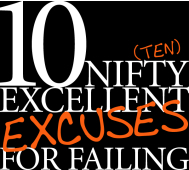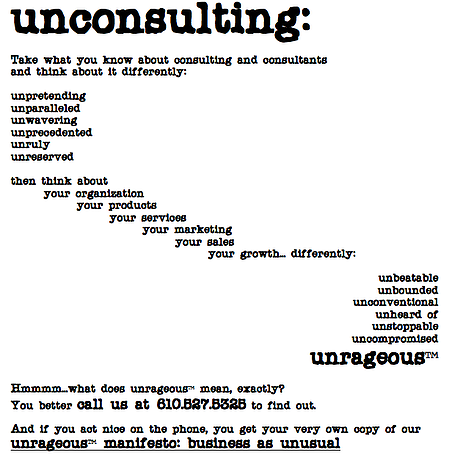 As a marketing speaker and marketing coach, it makes me mad - like really REALLY mad - when business owners, entrepreneurs and executives responsible for sales and marketing results start to whine about how hard it is to generate leads, cashflow, customers, clients and revenue.
As a marketing speaker and marketing coach, it makes me mad - like really REALLY mad - when business owners, entrepreneurs and executives responsible for sales and marketing results start to whine about how hard it is to generate leads, cashflow, customers, clients and revenue.
Guess who is NEVER to blame for failing in these scenarios?
Yup - you guessed it: THEM.
I recently read an article in the New York Times about a management consultant whose business - and I quote - "was drying up." In another part of the same article, the writer said that this consultant was "running out of work as a management trainer."
Really? There's no more work to be done? Corporate America is all fixed now? Hmmm... someone should send a press release. That's pretty big news.
"Work drying up" and "running out of work" are both terrific euphemisms for... YOU suck at marketing.
And/or you are unwilling to make changes, get help, partner, delegate, outsource, or innovate.
And ALL of these shortcomings are 100% your own damn fault.
So without further ado, here are the Top 10 Nifty Excuses for Marketing Failure. If you promise to ERASE these from your vocabulary starting immediately, you will be on a much better track to MAKE your numbers, IMPROVE your cashflow, and firmly PLACE responsibility for your failure OR success exactly where it belongs - 100% on YOU.
1. Business is drying up.
2. We're running out of work.
3. The industry has changed.
4. All my old clients have retired or moved on.
5. Our prospects and customers no longer have a budget for what we do.
6. Competition is tougher than ever these days.
7. The economy has had a major impact on our revenues.
8. We're selling sugar - it's a total commodity and our customers know it.
9. All prospects care about is price.
10. It's impossible to get through to anyone anymore - everyone hides behind voicemail and email and we can't even get a first conversation.
Do you know what all 10 of these are?
1. Excuses
2. That rare Japanese mushroom that Guy Kawasaki calls "Bull-Shitake"
Here's what they really mean - if you're interested in decoding them:
1. Business is drying up = Because you suck at marketing and can no longer rely on business that just falls in your lap.
2. We're running out of work = Because you haven't landed a piece of new business in over three years and because of that, your pipeline is as empty as a bead bucket on Mardi Gras.
3. The industry has changed = Because you haven't and it's so unfair that your outdated products, services, and programs are no longer relevant or valuable to today's buyers.
4. All my old clients have retired or moved on = See #2 above.
5. Our prospects and customers no longer have a budget for what we do = See #3 above.
6. Competition is tougher than ever these days = Because your competition has shifted, improved, streamlined, repositioned, repackaged, and innovated their way into your customers' hearts (and wallets) -- while you've been sitting on the sidelines watching the show with popcorn and a megaphone to amplify your whining.
7. The economy has had a major impact on our revenues = Because your successful competitors are saying the same thing -- only in a POSITIVE way -- as they've reinvented their value proposition to be MORE relevant, MORE valuable, and MORE necessary under the current economic climate than ever before. Hmmm... there's a good idea!
8. We're selling sugar - it's a total commodity and our customers know it = Because everything you DO and everything you SAY reinforces that impression. If YOU can't articulate the specific, tangible value of what you do vs. your competition, don't blame your customers. This goes way beyond what you SAY and how you say it - it impacts the very nature of your business, including what you DO and how you do it.
9. All prospects care about is price = Because you've failed to articulate and distinguish your product or service to the point where they know any better. Experts win on value. Generalists die on price. If you look the same, sound the same, and act the same as the competition, then you have only yourself to blame for the endless stream of tire-kickers, price shoppers and broke-ass losers who are wasting your valuable selling time.
10. It's impossible to get through to anyone anymore - everyone hides behind voicemail and email and we can't even get a first conversation = Because you're using old school interruption-style marketing and stupid sales tricks like cold calling and email spam. You need to integrate FOUR WORDS (embedded in the following two rules) into every marketing and sales strategy you deploy: 1. OFFER VALUE. 2. INVITE ENGAGEMENT. Do that -- and you'll get through.
Final word of advice - all of the excuses above can be summarized in one of two ways (both very fixable) - Your business is in trouble because of:
a. Failure to market and sell in new ways that are high-value, immediately relevant and sharply prospect-focused.
b. Failure to adapt, evolve and innovate your own mix of products, services, programs, and solutions.
Zen saying: A bend in the road is never a dead end. Unless you fail to turn.
What do you think? Have I pissed you off? Made you think? Made you money? Please use the COMMENTS area below to share your thoughts...




 Marketing Coach: 6-Step Secret Sauce for Awesome Email Subject Lines
Marketing Coach: 6-Step Secret Sauce for Awesome Email Subject Lines If you are looking to write a book, produce audio, video, or online assets, package a coaching or consulting program, or otherwise "productize" your expertise, keep reading... you'll like this post.
If you are looking to write a book, produce audio, video, or online assets, package a coaching or consulting program, or otherwise "productize" your expertise, keep reading... you'll like this post. 
 Here's the first in a series of marketing and business book reviews - but not just any old business books.
Here's the first in a series of marketing and business book reviews - but not just any old business books. One of the many pleasures of writing a book is writing the Acknowledgements section where you get to thank all the folks who have helped you at every point in your journey, whether it was last week, last year or all the way back to your childhood.
One of the many pleasures of writing a book is writing the Acknowledgements section where you get to thank all the folks who have helped you at every point in your journey, whether it was last week, last year or all the way back to your childhood.

 As a
As a 

